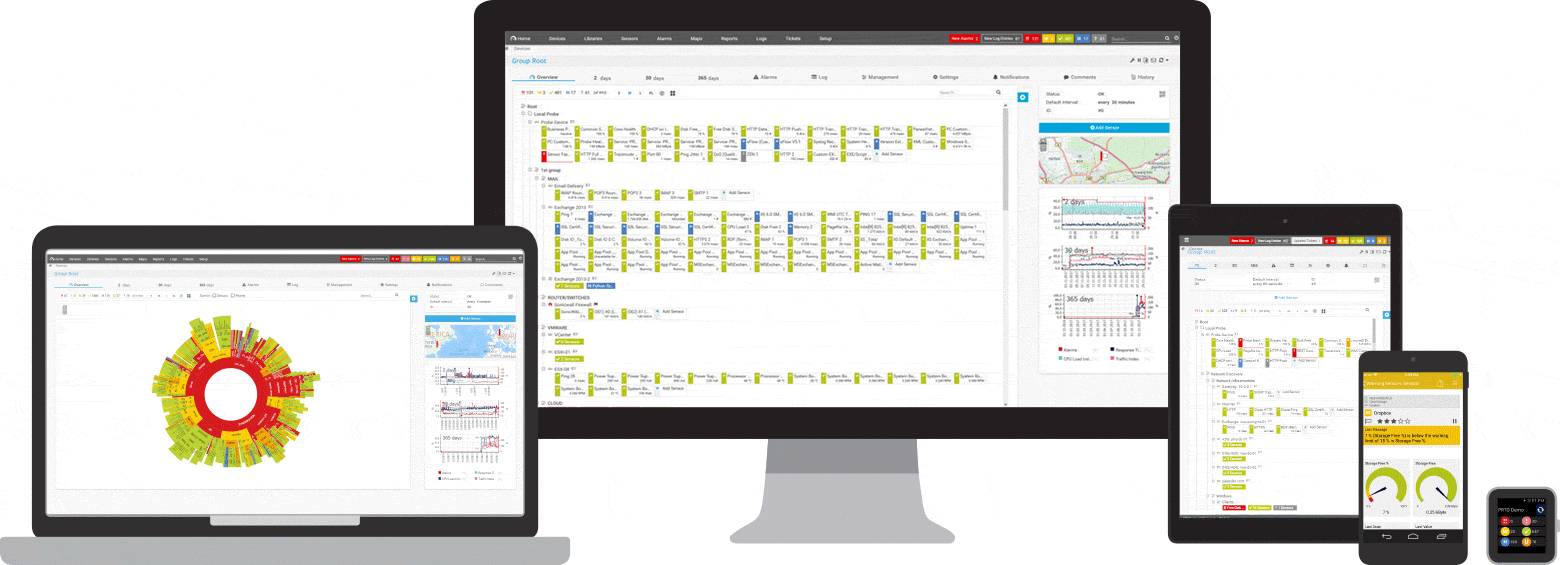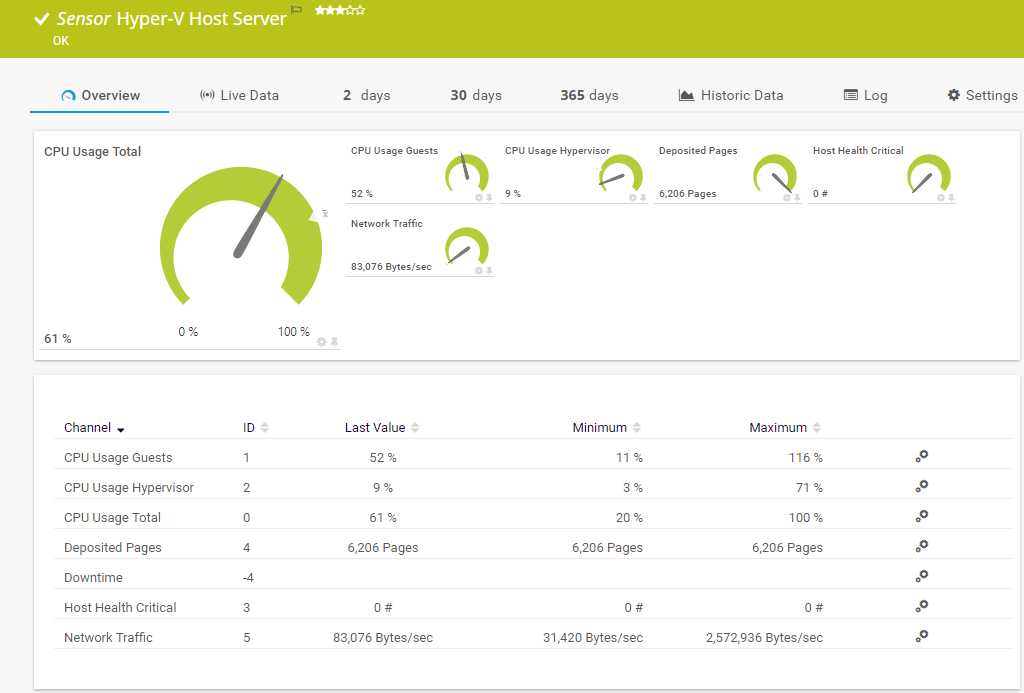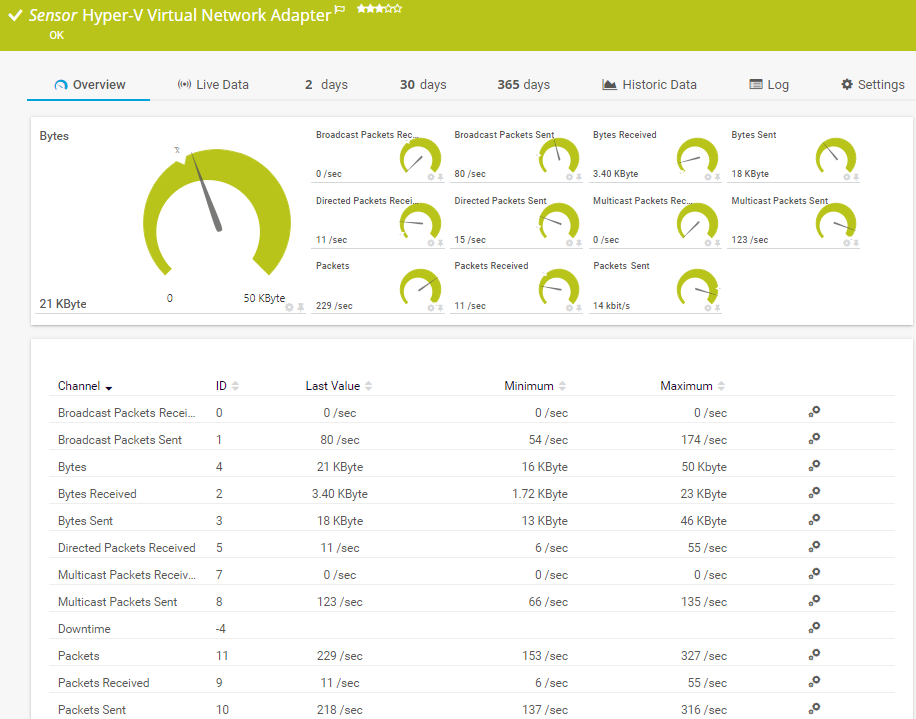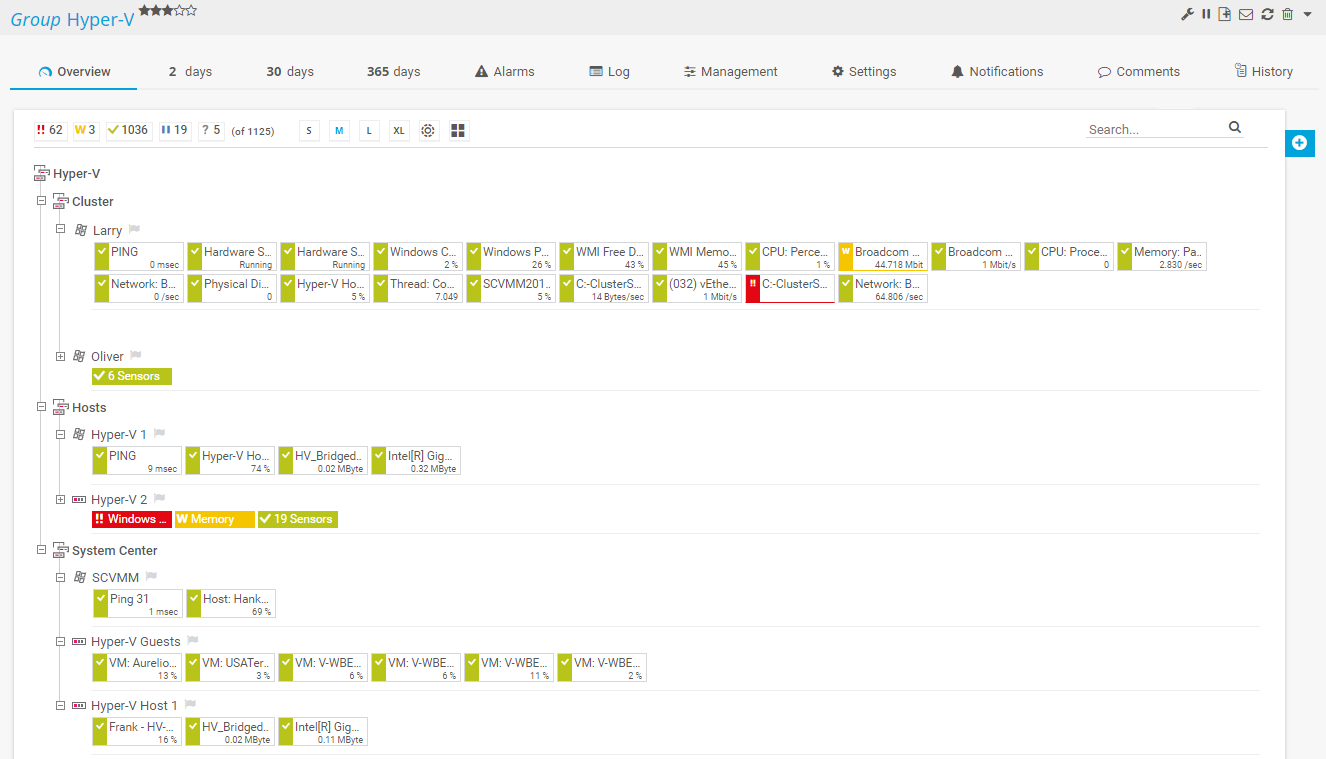PRTG Hyper-V monitoring: What you'll find on this page

PRTG makes Hyper-V infrastructure monitoring as easy as it gets
Custom alerts and data visualization let you quickly identify and prevent virtualization issues.
Increase the reliability of your Hyper-V virtual environment with PRTG
Hyper-V is a virtualization platform from Microsoft that enables users to create and manage virtual machines on Windows-based systems. It uses a hypervisor to manage both the Hyper-V server and virtual machines, which allows the VMs to run independently from the underlying hardware.
Virtualization in modern IT infrastructures: Many benefits, but also drabacks
Virtualization with solutions such as Microsoft Hyper-V has become increasingly important in modern IT infrastructures, as it allows multiple virtual machines to run on a single physical server. This not only improves resource utilization but also reduces costs while at the same time boosting the flexibility of your business.
Virtualization also comes with some drawbacks, however, such as a more complex IT environment and performance overhead due to an additional layer of software between the physical hardware and the virtual machines. Also, a critical error – whether of the network connection or the host itself – might affect several virtual servers at the same time.
Enhance your virtualization with comprehensive PRTG Hyper-V monitoring
It’s not a good idea to set up a virtualized environment without keeping an eye on CPU load, disk usage, performance, and network utilization of your VMs. Solutions for virtualization like Microsoft Hyper-V themselves usually offer only basic information about the status and performance of your virtual machines and the applications that run on them.
PRTG offers in-depth monitoring of all important data of your Hyper-V environment and arranges it into neat, customizable dashboards. Preconfigured Hyper-V sensors that you get out-of-the-box with every product license make setting up your Hyper-V monitoring very easy.
What Hyper-V monitoring looks like in PRTG
Diagnose network issues by continuously tracking Microsoft Hyper-V. Show all data about your virtual hosts, guest VMs, and virtual services in real time. Visualize monitoring data in clear graphs and dashboards to identify problems more easily. Gain the overview you need to troubleshoot latency, bottlenecks, and other performance issues.
Start Hyper-V performance monitoring with PRTG and see how it can make your virtual environments more reliable and your job easier.
3 reasons why PRTG is the perfect Microsoft Hyper-V monitoring tool
Keep an eye on all layers of your Hyper-V virtualization
PRTG monitors all aspects of your Hyper-V virtual environment. For virtual machines to run smoothly, their host must be stable and reliable. With PRTG, you can monitor, for example, the system status, disk usage, and CPU load of your Hyper-V host. To prevent errors or outages, we also recommend monitoring your most important virtual machines and the applications that run on the VMs, as well as the allocated storage.
Monitor Hyper-V via easy-to-read dashboards
With PRTG, you don’t need to manually check every single metric of your Hyper-V environment. Our virtual infastructure monitoring software offers a centralized view that combines all your monitoring data in a user-friendly dashboard. Additionally, you can design custom maps and dashboards with our easy-to-use drag-and-drop map editor to display your Hyper-V monitoring metrics the way you want.
Customize error thresholds, alerts & notifications
If you’re tired of constantly checking if your virtual environment is working properly, just sit back & relax with PRTG – whenever a problem with your Hyper-V resources or any other issue on your network occurs, our monitoring software will immediately alert you through highly customizable notifications, for example via email, SMS, push notifications, Teams or Slack messages, and more.
Your Hyper-V monitor at a glance – even on the go
Set up PRTG in minutes and use it on almost any mobile device.


Find the root cause of the problem with our PRTG Hyper-V monitoring solution
Real-time notifications mean faster troubleshooting so that you can act before more serious issues occur.
PRTG is compatible with all major vendors, products, and systems
Create innovative solutions with Paessler’s partners
Partnering with innovative vendors, Paessler unleashes synergies to create
new and additional benefits for joined customers.
PRTG makes Hyper-V monitoring as easy as it gets
Custom alerts and data visualization let you quickly identify and prevent virtualization issues.
Not only great for monitoring Hyper-V
PRTG also comes with preconfigured sensors for VMware. Due to our technological expertise and the compatibility of our monitoring software with VMware products, we’ve been a member of the VMware Technology Alliance Partner Program for some years now. More on VMware monitoring with PRTG
If you work with Citrix virtual environments in addition to Hyper-V or VMware, we’ve got you covered here as well – PRTG comes with several preconfigured sensors for monitoring your hosts and virtual machines. More on Citrix monitoring with PRTG.

PRTG: The multi-tool for sysadmins
Adapt PRTG individually and dynamically to your needs and rely on a strong API:- HTTP API: Access monitoring data and manipulate monitoring objects via HTTP requests
- Custom sensors: Create your own PRTG sensors for customized monitoring
- Custom notifications: Create your own notifications and send action triggers to external systems
- REST Custom sensor: Monitor almost everything that provides data in XML or JSON format
We asked: would you recommend PRTG?
Over 95% of our customers say yes!
Paessler conducted trials in over 600 IT departments worldwide to tune its network monitoring software closer to the needs of sysadmins.
The result of the survey: over 95% of the participants would recommend PRTG – or already have.
Still not convinced?
More than 500,000
sysadmins love PRTG
Paessler PRTG is used by companies of all sizes. Sysadmins love PRTG because it makes their job a whole lot easier.
Monitor your entire IT infrastructure
Bandwidth, servers, virtual environments, websites, VoIP services – PRTG keeps an eye on your entire network.
Try Paessler PRTG
for free
Everyone has different monitoring needs. That’s why we let you try PRTG for free.
Start Hyper-V monitoring with PRTG and see how it can make your virtual environments more reliable and your job easier.
|
PRTG |
Network Monitoring Software - Version 25.1.104.1961 (April 7th, 2025) |
|
Hosting |
Download for Windows and cloud-based version PRTG Hosted Monitor available |
Languages |
English, German, Spanish, French, Portuguese, Dutch, Russian, Japanese, and Simplified Chinese |
Pricing |
Up to 100 sensors for free (Price List) |
Unified Monitoring |
Network devices, bandwidth, servers, applications, virtual environments, remote systems, IoT, and more |
Supported Vendors & Applications |
|












